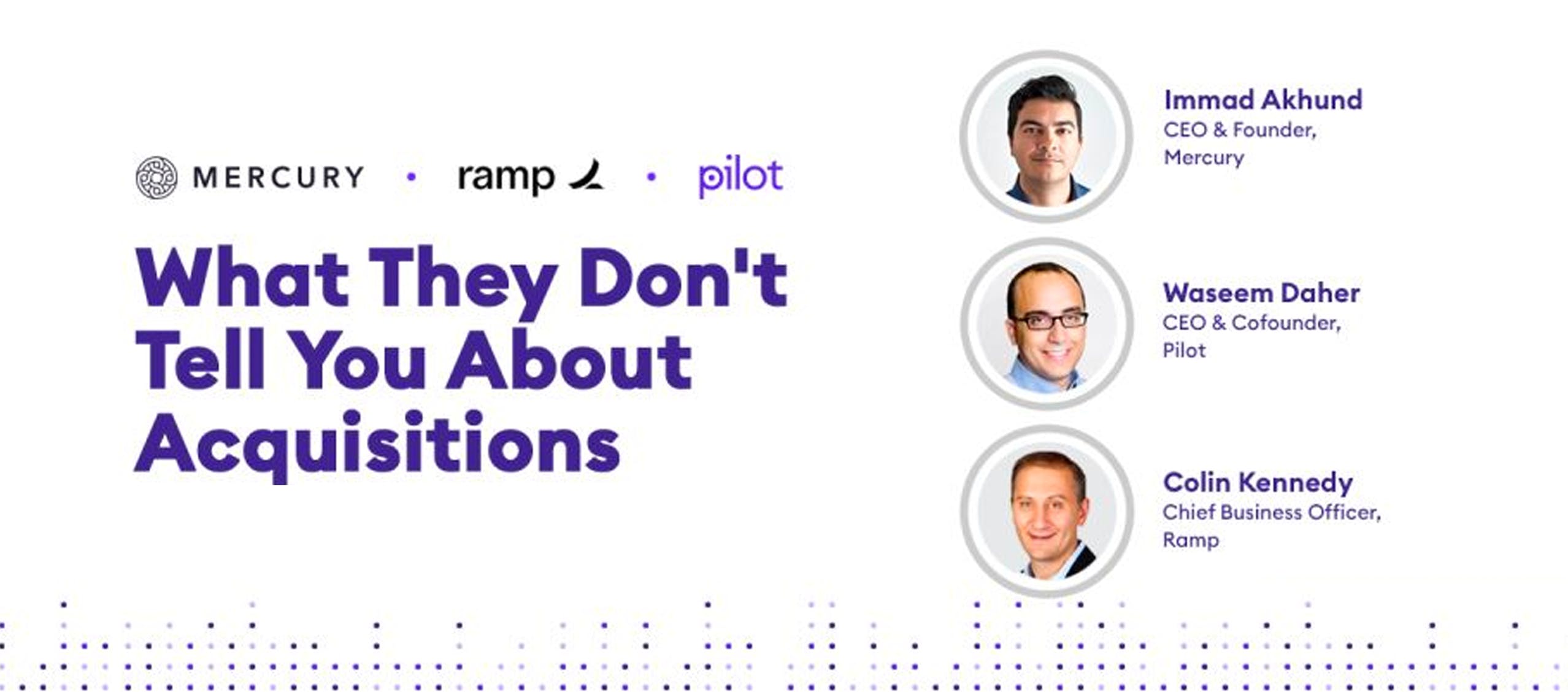Watch: What They Don’t Tell You About Acquisitions
A confirmation email has been sent to your email.

For most founders, the idea of selling their startup – whether in the near future, or further down the road – raises a lot of questions. What is the process actually like? How do you get the best outcome for your acquisition? How do you get interest from acquirers in the first place?
To get answers, we brought together three experts who’ve been there and done that: Mercury CEO and founder Immad Akhund, whose previous company Heyzap was acquired by Fyber, Ramp Chief Business Officer Colin Kennedy, who previously led M&A at American Express, and Pilot CEO and co-founder Waseem Daher, whose previous startups were acquired by Oracle and Dropbox.
The session covered a wide range of acquisition topics, from overall strategy to tactical approaches to how to decide if an acquirer is a good fit for you and your company. Read excerpts from the conversation below, and watch the full 57-minute session here.
On the Biggest Takeaway from Past Acquisitions
Immad Akhund
I guess [Waseem has] sold two companies, so maybe let’s talk a little bit there. How did those experiences vary? And when you were selling your second company, what were the biggest things that you took away from your first company acquisition and you applied successfully?
Waseem Daher
I guess now having done this twice, [there is a] big takeaway every time, at least from our perspective. And one of our advisors told us this way back in the early days is that companies are bought, they’re not sold, meaning it’s not like we willed selling the company into existence. It just happened actually that someone else was interested in buying the company, and that catalyzed a process. For example, Oracle acquired the first company, Ksplice. We had some technology that did software updates without rebooting. I’m sure you’ve seen that pop up. It’s like, “You must reboot.” We had tech to go in, basically tweak and modify the updates so you can install them while the system is running, which is useful for server infrastructure, that kind of thing.
And Oracle acquired the company because they wanted to bring that capability to their Linux offering. And then basically just one day, Oracle had called us up. We had met with them like two years prior to give them an overview of the tech, but the circumstances with which the actual acquisition came together had almost nothing to do with what we were doing. It was much, much more driven by the desire on the part of the acquirer. And similarly when Dropbox acquired our second company, Zulip, which was a group chat tool for businesses. It was sort of like a Slack-like product at a time when Slack was making a mobile game. It’s not that we could hit some particular usage milestone where they’re like, “Wow, this is amazing. We got to bring this into the Dropbox family.”
It was much more driven by considerations at Dropbox, which is like, “Look, we’re growing aggressively. We want to add a bunch more talent to the team. We want to look at stuff that is higher level than just file sharing. We’re very interested in this idea of communication, collaboration, things you might do on top of your files. It was basically purely motivated by desires on the part of the acquirer. And I think that is the, maybe one of the big lessons internalized, at least from my side, is your company isn’t bought because you’d like to sell it. Your company is bought because someone wants to buy it. And that distinction actually says a lot about timing. I’m curious, actually for the two of you, if that resonates with maybe your own experience as well.
Immad Akhund
Actually we tried to sell Heyzap for multiple years, because we actually pivoted the company full-time. I would say we weren’t that excited about what we were doing. We were just surviving, you know what I mean? We got into ads. And at various points, we were like, “Okay, we should try to get sold.” And we spent ages, like we spent months talking to people, and the slightly annoying thing is if you go to Google, and Apple, and Facebook and all these people, they’ll talk to you because they have full-time people that pay to talk to people. And you get all excited about it as an entrepreneur. You’re like, “Wow, I’m talking to Corp Dev at Google and that’s going to help.” But the reality is, until you do something that fits into that company’s agenda… And they’re almost making a build versus buy kind of decision, at least for these scale acquisitions, I think, where they’re really deciding, “Hey, I want to build X. Oh, I can buy this for X million and that saves me two years and this company already has traction.”
So the final thing we did, which is I won’t bore people with exactly what it was, but it was strategically quite an interesting thing because it was something that, like Twitter had acquired a company called MoPub in that space. And Apple had acquired a company called Burstly in that space. So everyone was interested in that space, and we did something that was fairly successful in that space. And that really resonated with acquirers. And we went from, I could not persuade anyone to buy this thing, to we literally had like seven or eight people approach us saying, “Hey, can we try to acquire you?”
And that was very surprising to me, because… To speak to your point, I did think you could sell a company. And we were actually making money, about the same amount or more money actually the year that we got acquired. But it wasn’t about that. It was just about strategically fitting into what those companies wanted, and we did something that fit into that. So I do think in a small way, you can make a company to be acquired, you just have to strategically and understand what that other company needs and build that. And I have actually seen that work out successfully, but it is a strategy and I don’t think it’s a great strategy necessarily.
On the Different Types of Acquisitions
Immad Akhund
I think it’s worth talking about, what are the different types of acquisition? Is it an acqui-hire versus a technology integration thing, versus a revenue and customer thing, and versus I guess sometimes it’s a bit of everything. Did I miss one? Technology, revenue-
Colin Kennedy
No, I think you got the key categories, for sure.
Immad Akhund
I do think that you as a company can position yourself when it’s the first one, or the second one or the third category. Is it very different, or is it a similar process?
Colin Kennedy
Yeah, I think it’s a really good question. I think there are two pieces. I think that the first piece is really around, why do you as a company, want to be acquired by the particular acquirer that you’re talking to? It can be easy. It’s very natural, in a lot of cases, to get excited because company X is expressing some interest. Presumably if you’re running your business effectively, you’ve invested so much of your life into it, you know you have something valuable. It can be hard to assess what that value is. It can be as hard to assess how you want to deal with that value. But you probably have some pretty strong principles for where you want the business to go, and what’s going to motivate you and get you and your team. I think getting a feel from the acquirer and asking them very openly, “What’s driving the interest,” and pressure testing that.
Meaning if they’re saying they’re acquiring you for the talent, then there should be a set of questions around that. They should be focusing deeply on trying to assess the talent more deeply. If there’s that match between what they’re saying they want to do and what they’re actually exploring through diligence, and more importantly with what you as a company want, it can lead to just a really good foundation.
I think to your question around how do you position yourselves, I think if there is alignment around where you want to go, then I think if you are coming into a situation where it is going to be more the product fits, or a product adjacency, talking about the fact that you’ve considered either partnering with companies like them, or deeply already have partnerships with companies like that. That you’re aware there is some synergy there. Talking about the extent to which it’s part of your development philosophy, talking about what you’ve heard from customers that would suggest this could resonate well.
The acquirers are often doing a ton of research to try to know these spaces really, really well. Any quality acquirer is having a ton of conversations, and they’re also aware that just as we don’t understand their business extremely well, they may not understand aspects of our business as well as they would like to. And they’re looking for some proof points to say, “Okay, we’re requiring you for a product. What we think is going to be a compelling offering, we think the classical A plus B is going to equal C, and C is going to be huge and great.”
Immad Akhund
I think one thing that probably isn’t obvious to entrepreneurs sometimes is that even if you have 10 or 20 million in revenue, that’s nothing to a Google or Facebook. So I think sometimes people go in thinking, “Oh, I built this big business.” There’s still value in your company in terms of a valuation that may be a multiple, but they’re not buying you for the revenue. But if you do go to a smaller company or PE firm or something like that, that’s when your revenue can matter a lot more.
On Getting Third-Party Negotiating Help
Immad Akhund
What do you think about using investment bankers or some third party to help with negotiation, and closing and things like that?
Colin Kennedy
From my perspective, I think it’s extremely helpful to use some intermediary or some third party to help. I think the term intermediary can be a little bit misleading here in that you’re not looking to be disintermediated from the process. You’re more looking to have somebody who can play a role to truly help you and facilitate the deal, be the advocate for the deal, for the transaction, and an advocate for you. It can be a very hard negotiation. It’s a long negotiation. It’s a hard process.
I think who plays that role…I think it’s less about the particular skill set and more around whom do you really, really trust? Who can have a real honest conversation with you? And who’s going to also have [their] incentives align where they also are trying to facilitate a deal at the end of the day?
Immad Akhund
I think one factor in this, which at least wasn’t obvious to me before I went through this process. I would have thought an investment bank or whoever helps is all about optimizing how much money you get out of the situation, which I think it is partly that.
But I think the actual bigger thing is actually having someone that is not emotionally invested in getting this deal through, so that when the other party negotiates with you and you’re like … Yeah, especially when you’re not a rich entrepreneur and you’re like, “Wow, my net worth just went down by $1 million in this line here.” It becomes very emotional, whereas if there’s some third party and they’re just going, “Hey, sorry, we agreed to 40. You’re trying to reduce it to 35. That’s not happening.” Then they can be much more impartial and just look at it in a way that I think you, as an entrepreneur, cannot. Waseem, did you use anyone?
Waseem Daher
We did not in our previous deals. They were also comparatively small in the sense that Ksplice was probably 15 people when it was acquired and Zulip was like 12 people when it was acquired. They were not enormous transactions from a complexity of transaction perspective. So we didn’t. Did you in Heyzap?
Immad Akhund
Yeah, we actually had an investment banker. He was great at negotiating, and we actually managed to get it so [that] we got an LOI from two different parties at the same week. And it was super useful in negotiation. And the reason that came together was I think actually mostly him… I think that was something that if I ever did it again, I would want to have more people that are intermediaries that are aligned with the company and can be unemotional. Because the other side you’re negotiating with, they have no emotions. They’re just purely doing it to get the best deal, which is kind of like a power imbalance otherwise.


